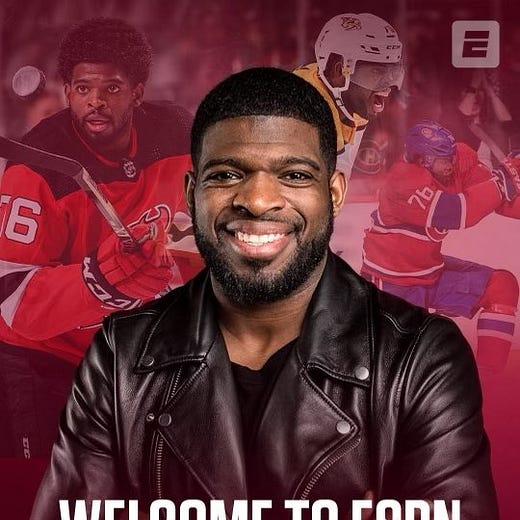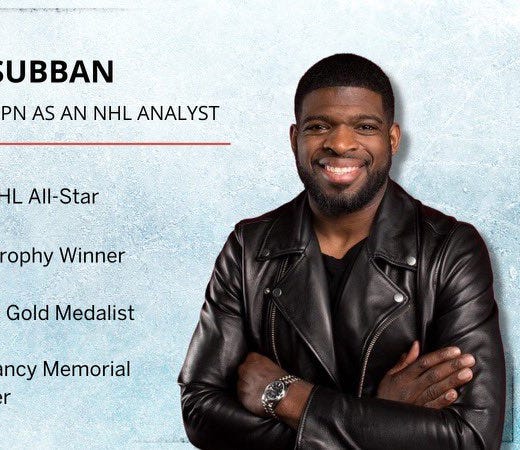Media Mondays: On P.K. Subban and ESPN
On how it'll work and why it's a good thing for ESPN's overall coverage
We love alliteration here. The site is called, “Shap Shots.”
So in the spirit of the thing, I’m adding another piece of alliteration and launching a new semi-weekly feature, “Media Mondays.”
As frequently as required, and as need arises, we’ll talk about the hockey media landscape on Mondays. It’ll be a combination of stories, observations, and general thoughts on the industry.
Yes, I am part of the hockey media landscape. I’m aware that can be a sticky situation, but we will do our best to give full transparency.
And it’s a perfect week to start this after the news became official last week that P.K. Subban was joining ESPN’s NHL coverage on a multi-year deal after retiring from the NHL.
Subban is only 33, his playing career is over sooner than I would have expected and as someone who is four days older than Subban, I’m started to feel particularly old these days.
Subban, however, has one of the more unique retirements in NHL history. It’s the first, in my view, where someone has chosen my profession (media) over the one that many in my profession dreamed of their entire lives before they realized they’d have to write or broadcast, not skate, their way into hockey arenas professionally.
Subban could be in the NHL right now. He could have have signed for a veteran discount, there are many NHL teams he’d improve, right now, but instead of trying to keep, “living the dream,” and chasing a Stanley Cup, he decided to simply step into a broadcast booth in Bristol, Connecticut.
It’s a divergence from the typical player-turned-broadcaster path. Players that become broadcasters typically back into the role once all playing options have been exhausted. And when they do become broadcasters, many have a clunky landing or struggle to find their footing, because they effectively hid most of their personality for the entirety of an NHL career.
Subban, like a Paul Bissonnette, will have success in broadcasting because he isn’t reinventing himself to get into the booth. He’s been a personality, he’s grown a brand, and he’s simply transferring his brand from the New Jersey Devils (or whichever NHL team employed him before) to ESPN.
It’s the outcome some of those within the NHL offices in New York had been hoping for. Subban represented a chance to get a recently-retired player, who actually won individual awards, into the hockey media space and potentially unlock some of the other NHL personalities.
Unfortunately, this isn’t going to be a paradigm shift, like the NHL is hoping for. The NHL is getting more user friendly and some personalities have been developed, but Subban has always been seen as unique by his peers, and sadly, has been used as a cautionary tale by some agents of why you don’t make your personality bigger than your game.
Hockey remains broken in this way, and Subban going to ESPN isn’t going to change that.
What Subban going to ESPN should change, however, is how on-air talent is managed by ESPN. ESPN’s coverage of the NHL has been adequate, but dated, it relies heavily on the opinions of Mark Messier and Chris Chelios, who are caught in a weird limbo when it comes to roles.
ESPN wants Messier and Chelios to be pundits and analysts who think on their feet in the studio. Neither have thrived in that role and Steve Levy often has to play the setup role to make things run smoothly.
Remember that ESPN originally wanted Wayne Gretzky, they reached out to him first, and when they couldn’t match the money TNT offered, they went to his No. 2 center from the Edmonton Oilers. No. 99 holds meaning beyond hockey, even if Gretzky flopped as a broadcaster people would still care, Messier doesn’t have that clout and ESPN has tried to force it with recent commercials.
Messier and Chelios should be storytellers with pre-taped segements as opposed to analysts, and ideally this is where the Subban hire could better shift ESPN’s coverage. Subban already better understands the nuances of the media world, he’s signed on already for an ESPN+ series, PK’s Places, and while he took outside heat for his personality during his playing career, Subban always understood when it was time to be serious about something or not.
Being a well-managed brand, like Subban, you learn either organically or by force which things are and aren’t worth amplifying within your skillsets. Subban won’t allow ESPN to put him in a role where he will fail, his brand is too valuable.
Messier and Chelios don’t care about their personal media brand that way and don’t have the personal handlers around them, like Gretzky and Subban, to make sure they don’t fall flat on a project or end up in a position where they look unprepared.
To wrap this up, ESPN added an asset to its lineup that understands the symbiotic relationship of this weird media world. Subban knows an ESPN job can mean bigger things in the future, his brand can grow outside of hockey, and ESPN knows that Subban is a prime candidate to eventually want more from the greater media landscape — Subban looks at Michael Strahan’s career, for example, as a potential long-term goal.
It will make ESPN’s hockey coverage better, but only if ESPN understands why he’s making ESPN’s hockey coverage better. Subban is still hungry for the next job, he wants to prove he can be elevated, he’s not looking at ESPN as mountain he can rest on and simply point to his achievements as a player.
ESPN’s best hockey analysts have had that formula for success.
Kevin Weekes and Emily Kaplan have both used the network to grow their respective roles within the hockey community, and both should be featured more often on the traditional TV broadcasts. Arda Ocal has rightfully been included more in hockey coverage and earned that opportunity, and should be featured more going forward as a host.
For those individuals, like Subban, it’s a matter of career elevation beyond the ice. It’s a matter of driving for something more, and ESPN is part of a journey and not just a gifted crowning achievement.
Shap Shots stuff/updates:
First off, do you like this media commentary? Please let me know in the comments. It’s on the free tier this week since it’s a new concept, but will likely be a paid feature in the future.
We’ve hit 200 paid subscribers at this site, which is amazing. Thank you to everyone who has been reading and is supporting it financially. The more that number grows, the more time/resources can be put back into it and making it better.
The mailbag will be back this week, I’ve got your questions from last week, but if you want to add some more you can do so here.
Some other planned coverage things for this week:
I had a good conversation with Red Wings goalie Ville Husso last week. Then he let up eight goals on Thursday… so saving that story for a more positive lede to write off.
There will be at least one short podcast this week for paid subscribers, still hammering out a couple topics and deciding on that front.
There will likely be game observations posts from a couple nights this week. Which nights exactly are still to be determined, but based off readership/susbcribers games featuring the Dallas Stars and Detroit Red Wings have taken preference.
Thanks for reading!





I like Media Monday! I'm glad you brought up the Chelios/Messier issue. They seem so stiff and it makes conversation far less fluid than it should be for national broadcast. Not to be too much of a homer, but I feel like Razor is such a prime example of player turned analyst. Knowledgeable but confident and entertaining. Hopefully P.K. can do the same.
I enjoyed this read and, despite having much less context for it, as someone who only really watches early games (from a non-north American market) and with much less awareness of the different broadcast teams etc), I would still be interested in more.
Perhaps something on the fan perceptions of locally broadcast games vs national? I know that I get a bit disappointed if one of the few Stars games I can watch doesn’t have Josh and Razor’s commentary etc, but I don’t know whether this is something other people care about too much?